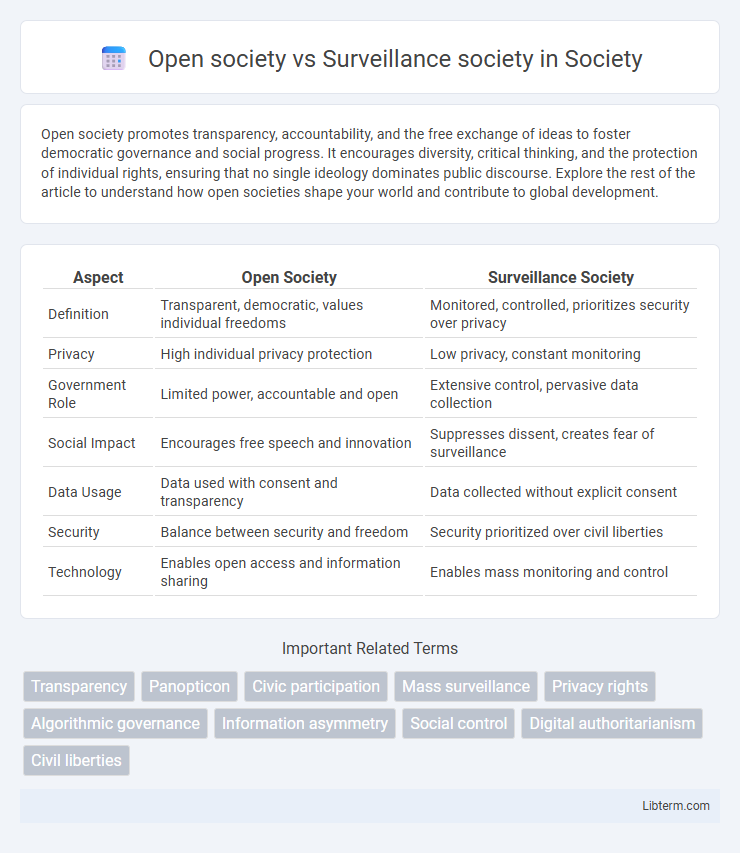Open society promotes transparency, accountability, and the free exchange of ideas to foster democratic governance and social progress. It encourages diversity, critical thinking, and the protection of individual rights, ensuring that no single ideology dominates public discourse. Explore the rest of the article to understand how open societies shape your world and contribute to global development.
Table of Comparison
| Aspect | Open Society | Surveillance Society |
|---|---|---|
| Definition | Transparent, democratic, values individual freedoms | Monitored, controlled, prioritizes security over privacy |
| Privacy | High individual privacy protection | Low privacy, constant monitoring |
| Government Role | Limited power, accountable and open | Extensive control, pervasive data collection |
| Social Impact | Encourages free speech and innovation | Suppresses dissent, creates fear of surveillance |
| Data Usage | Data used with consent and transparency | Data collected without explicit consent |
| Security | Balance between security and freedom | Security prioritized over civil liberties |
| Technology | Enables open access and information sharing | Enables mass monitoring and control |
Introduction: Defining Open and Surveillance Societies
Open societies promote transparency, freedom of expression, and citizen participation, fostering an environment where information flows freely and privacy is respected. In contrast, surveillance societies prioritize extensive data collection, monitoring, and control mechanisms to enhance security and order, often at the expense of personal privacy and civil liberties. Understanding the fundamental differences between these two social models is essential for evaluating the balance between individual freedoms and societal security in contemporary governance.
Historical Roots of Open Societies
Open societies trace their historical roots to the Enlightenment era, emphasizing values such as individual freedom, transparency, and democratic governance inspired by philosophers like John Locke and Karl Popper. These societies prioritize open discourse, rule of law, and protection of civil liberties as mechanisms to prevent authoritarianism. The development of print media and public institutions during this time further cemented the foundation of open societies by fostering informed citizen participation and accountability.
The Rise and Expansion of Surveillance Societies
The rise of surveillance societies has been propelled by advancements in digital technology, enabling extensive data collection and monitoring by governments and corporations. Expanded use of facial recognition, internet tracking, and mass data analytics has blurred the boundary between public safety and privacy infringement. Surveillance societies prioritize control and security, often at the expense of civil liberties and transparency characteristic of open societies.
Core Principles: Transparency vs. Control
Open societies emphasize transparency, ensuring government actions and decisions are accessible and accountable to citizens, fostering trust and democratic participation. Surveillance societies prioritize control by continuously monitoring individuals' behaviors and communications, often restricting privacy to maintain security and order. The core tension between these models lies in balancing openness with oversight, where transparency supports freedom, and control enforces conformity.
Technology’s Role in Shaping Societal Structures
Technology plays a pivotal role in shaping societal structures by enabling both open societies centered on transparency, accessibility, and citizen empowerment, and surveillance societies characterized by data collection, monitoring, and control. Innovations in digital communication and data analytics support democratic participation and free information flow, while advanced surveillance technologies such as facial recognition and AI-driven monitoring facilitate state or corporate oversight. The balance between technological innovation fostering openness versus enabling surveillance directly influences governance models, civil liberties, and social trust in contemporary societies.
Privacy Rights and Government Oversight
Privacy rights in an open society emphasize transparency, individual freedoms, and limited government intrusion, ensuring citizens control their personal data. In contrast, a surveillance society prioritizes extensive government oversight through pervasive monitoring technologies, often compromising privacy for security and control. Balancing these frameworks requires robust legal protections to safeguard civil liberties while enabling effective governance.
Freedom of Expression and Information Access
Open societies prioritize Freedom of Expression and Information Access, fostering transparent communication and diverse viewpoints essential for democratic governance and innovation. Surveillance societies, characterized by extensive monitoring and data collection, often limit these freedoms to maintain control and restrict dissent, undermining public trust and individual autonomy. The balance between security and liberty remains a critical debate, with open societies advocating for minimal state interference to ensure free flow of information.
Social Trust and Civic Engagement
Open societies foster high social trust and robust civic engagement by promoting transparency, accountability, and individual freedoms, which encourage citizen participation in public affairs. Surveillance societies tend to erode social trust through constant monitoring, generating fear and mistrust among the populace, reducing willingness to engage in civic activities. Studies reveal that excessive surveillance correlates with lower levels of community cooperation and weakened democratic institutions.
Global Case Studies: Successes and Failures
Open societies prioritize transparency, citizen participation, and protection of privacy, exemplified by Nordic countries where robust data protection laws coexist with digital innovation. Surveillance societies, seen in China's extensive use of facial recognition and social credit systems, demonstrate state control but raise significant human rights concerns. Successes in open societies include strengthened democratic accountability, while failures in surveillance states highlight risks of authoritarianism and social repression.
The Future: Balancing Security and Liberty
The future of governance hinges on balancing security imperatives with preserving individual liberties, where open societies emphasize transparency, accountability, and citizen participation to safeguard democratic values. Surveillance societies prioritize extensive data collection and monitoring to enhance security but risk eroding privacy and freedom, leading to potential abuses of power. Implementing ethical frameworks, robust legal protections, and advanced privacy-enhancing technologies can help harmonize security needs with civil rights, ensuring a resilient, rights-respecting societal model.
Open society Infographic

 libterm.com
libterm.com